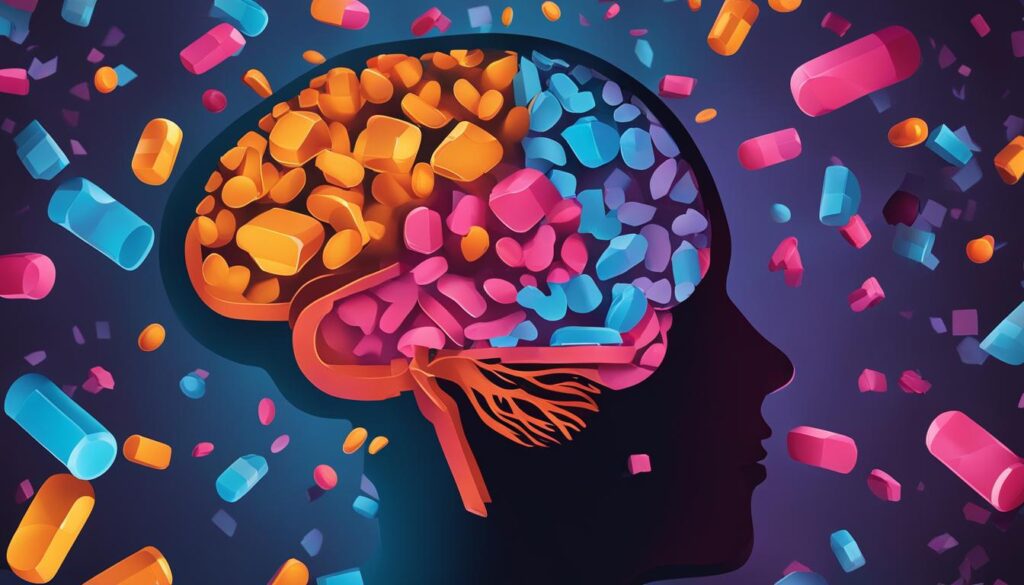If you’re among the millions who rely on Adderall for managing ADHD, you may have pondered over the question, “can Adderall cause depression?” It’s a valid concern, considering the intricate relationship between Adderall and mood disorders. As you strive for focus and productivity, understanding the potential mental health impacts of this medication is critical. The dialogue around Adderall and depression is growing, and for good reason. Before diving deeper into this topic, let’s set the foundation for why it’s essential to explore the possible connections between a widely-used stimulant and emotional well-being.
Understanding Adderall and Its Purpose
When you consider Adderall and mental health, it’s crucial to first grasp what Adderall is and why it’s a cornerstone in managing ADHD. It’s not just a household name—it’s a specifically crafted stimulant medication. As you explore how Adderall might affect your mood, knowing its intended Adderall purpose will enlighten your understanding of its broader implications.
Adderall, known generically as amphetamine and dextroamphetamine, is a potent central nervous system stimulant. It’s designed to enhance focus, attention, and control behavior by targeting certain neurotransmitters in the brain. Chiefly used for treating ADHD, Adderall supports the increase of dopamine and norepinephrine concentrations, vital for regulating attention and executive functions.

To demystify how Adderall operates in the brain, envision neurotransmitters as messengers, carrying signals between neurons. Adderall promotes the release of these critical messengers, fortifying the neural pathways that underpin focus and attentiveness. This process is fundamental for individuals with ADHD, who often encounter an innate neurotransmitter imbalance.
| FDA-Approved Uses | How Adderall Amplifies Effects |
|---|---|
| ADHD Management | Boosts dopamine and norepinephrine to improve concentration and reduce impulsivity |
| Narcolepsy Mitigation | Stimulates the central nervous system to help control sleep cycles |
Despite its efficacy, there’s no denying that Adderall can be a double-edged sword. Observing its influence on ADHD is vital, but equally important is understanding how it could potentially sway your mental health. The interactions within the brain are sophisticated; though Adderall corrects neurotransmitter deficiencies in the short-term, its long-term impact remains a subject of discussion.
Moreover, beyond its primary function, there’s an expanding narrative about the potential for Adderall to influence emotional regulation, with some users reporting mood fluctuations. As you navigate through the details, consider these foundational insights as a primer on the complexity of Adderall and its diverse effects on the mind and body.
Unveiling the Connection: Adderall and Depression
For many seeking enhanced focus and control over their ADHD symptoms, Adderall has been a cornerstone medication. However, concerns about whether can stimulants cause depression highlight the need to look closely at the implications of its use. We’ll delve into research that connects the dots between Adderall-induced depression and the intricate operations of brain chemistry.
What the Research Says
Studies probing into the association between Adderall and mood disorders have surfaced with intriguing findings. One significant observation is the potential for Adderall to alter mood, leading to symptoms resembling depression. While not everyone experiences these side effects, research suggests that individuals may encounter them based on specific criteria, like dosage, frequency of use, and personal sensitivity to the medication.
The Role of Dopamine
Diving into the realm of neurotransmitters and mood, it’s essential to grasp the role of dopamine in depression. As a neurotransmitter responsible for reward and pleasure signals in the brain, dopamine is central to our feelings of happiness. Adderall and dopamine are therefore closely linked, as Adderall increases dopamine levels to help manage ADHD. Nevertheless, this rise in dopamine can disrupt the delicate balance necessary for stable mood regulation, potentially leading down the path of depression.
The nuances of dopamine function are critical here—while Adderall boosts focus by elevating dopamine levels, the aftermath might include a corresponding crash, which could manifest as depression. This complex response to Adderall, whereby the initial elevation in mood is met with a depressive rebound, has opened a dialogue on whether stimulant medications can inadvertently precipitate mood disorders.

Personal Accounts and Case Studies
While scientific studies offer a macro-level view, personal experiences with Adderall provide ground-level insights. Numerous accounts from individuals spotlight the subjective aspect of Adderall’s impact on mood.
Some describe a sense of emotional dullness following prolonged use, while others mention episodes of profound sadness and lack of motivation—a stark contrast to the drug’s intended effects.
Compiling these narratives adds depth to our understanding, complementing clinical research with real-world testimonies.
Among the rich tapestry of these narratives, case studies on Adderall and depression stand out. These focused examinations reveal patterns akin to depressive symptoms in some participants, shedding light on the possible emotional consequences of regular Adderall use. This subjective evidence, when viewed in conjunction with quantitative research, paints a fuller picture of the possible mental health implications of Adderall.
| Aspect of Interest | Research Findings | Personal Narratives |
|---|---|---|
| Prevalence of Mood Changes | Variable; dependent on individual factors | Reports of episodic depression |
| Impact on Neurotransmitters | Elevation of dopamine levels could lead to imbalances | Experiences of emotional instability post-use |
| Long-term Mental Health Effects | Requires further study; potential for depressive symptoms | Descriptions of mood fluctuations after prolonged use |
As you process this information, remember that the experiences and outcomes vary widely, and the presence of Adderall-induced depression is not an absolute certainty but a possibility to be informed about. Balancing the need for ADHD symptom management with the need to maintain emotional equilibrium thus becomes key in navigating Adderall use.
Side Effects of Adderall That May Affect Mood
When you’re prescribed Adderall to manage ADHD symptoms, it’s important to stay informed about its side effects of Adderall, especially those related to mood. Adderall, like other stimulants, can lead to a range of emotional changes. Recognizing Adderall mood changes is key to addressing them early and maintaining your overall well-being.

Knowing what side effects may arise can help you distinguish between common responses to the medication and more concerning symptoms that should prompt a conversation with your healthcare provider. Here’s what you need to be on the lookout for:
- Anxiety
- Restlessness
- Irritability
- Mood swings
- Depression
These stimulant side effects can disrupt your daily life and emotional regulation. For some, mood alterations might be subtle and gradually fade as the body adjusts to the medication. For others, they may be more intense and persistent, potentially leading to feelings of depression.
The complex interaction between Adderall and your brain chemicals means that while you might feel an increase in focus and energy, your emotional state may also fluctuate. This is due to the way the drug increases dopamine levels which, when altered, can significantly affect your mood.
It’s like riding a rollercoaster – initially, there’s a rush of energy and euphoria, but as the effects wear off, you might feel a sudden drop into a depressive state.
Let’s take a look at a table that further details these side effects and their potential impact on mood:
| Side Effect | Potential Impact on Mood |
|---|---|
| Anxiety | May increase feelings of nervousness and worry, leading to heightened stress levels. |
| Restlessness | Can disrupt sleep patterns, which in turn can affect emotional stability. |
| Irritability | Might cause you to have a shorter temper and be more prone to mood swings. |
| Mood swings | Erratic changes in mood that make emotional regulation more challenging. |
| Depression | A severe drop in mood following cessation of the drug’s action, sometimes persisting for longer durations. |
While understanding the side effects of Adderall is crucial, remember that not everyone will experience these mood changes. Factors like individual brain chemistry, dosage, usage patterns, and personal history of mental health can influence the likelihood and severity of side effects.
In case you do find yourself facing challenging mood fluctuations, especially if they’re impacting your quality of life, it might be time to discuss these changes with your healthcare provider for potential adjustments to your medication regimen or additional supportive measures.
Long-Term Effects of Adderall on Mental Health
Exploring the long-term effects of Adderall on mental health is vital, especially if you or someone you know is part of the increasing number of individuals using Adderall for chronic management of ADHD symptoms. Scientific inquiries over the years have gradually painted a more precise picture of how Adderall could influence mental health when used over an extended period.
When discussing Adderall, it’s essential to consider the potential ramifications of long-term use on the very fabric of mental well-being. The question isn’t just how Adderall affects focus and energy levels, but how it may shape and mold the contours of one’s mood and emotional landscape in the long run.
Studying the Impact Over Time
Longitudinal studies play a critical role in assessing the chronic use of Adderall and its potential link to mood disorders. These studies track individuals over years and sometimes decades to observe the cumulative effects of medication usage.
It’s through these diligent, long-spanning research efforts that patterns begin to emerge, offering insights into the possible mental health landscape of seasoned Adderall users.

Academic and clinical research suggesting a correlation between Adderall chronic use and the onset of depression brings about important considerations. Does the continued use of a stimulant, even one as well-established as Adderall, predispose individuals to develop depressive disorders, or does it contribute to an exacerbation of existing mental health issues?
Armed with the knowledge of complex interactions between brain chemistry and chronic stimulant use, healthcare professionals and patients alike are taking a more cautious and informed approach to the management of ADHD.
| Duration of Use | Reported Mental Health Impact | Considerations |
|---|---|---|
| Short-Term (Less than 6 months) | Milder mood fluctuations | Need for careful observation of mood changes |
| Intermediate (6 months to 2 years) | Varied reports of mood stability and instability | Importance of regular mental health check-ins |
| Long-Term (2 years and beyond) | Increase in depressive symptoms; more noticeable impact on mood disorders | Risk-benefit analysis of continued Adderall use |
By comparing the mental health outcomes of individuals at various stages of Adderall use, the table above underlines what many have experienced: a pronounced shift in the risk profile as the duration of usage extends further into the future.
These studies point to an undeniable need for caution in prescribing practices and the clinical monitoring of patients undergoing prolonged stimulant therapy. As you sift through the findings, construe them not as dire predictions but as guideposts for mindful medication utilization and vigilance towards your mental health journey.
So, if you’re on the path of long-term Adderall therapy, it’s crucial to approach it with an awareness of its potential impacts on your mental health. Regular consultations with healthcare providers, transparency about any mood changes, and an open dialogue about the balance between ADHD management and mental wellness can make all the difference in safeguarding your mental equilibrium.
Remember, maintaining mental health is not just about treating symptoms; it’s a continuous process of adjustment, assessment, and, most importantly, self-care.
Adderall Misuse and Its Association with Depression
The shadow of Adderall misuse and depression looms over the heads of many who seek a competitive edge or a makeshift solution to their focus problems. It’s not merely about the caliber of the drug but how the non-medical Adderall use can potentially spiral into a pitfall of mood disorders. In this discussion, the spotlight is cast on how such misuse, especially without a medical prescription, correlates to an upsurge in depressive symptoms among users.

First, let’s unpack the term Adderall misuse. It refers not just to those taking the medication without a prescription, but also includes scenarios where individuals may take higher doses than prescribed, take it more frequently, or use it in a manner not intended by medical guidelines, such as crushing the pills for snorting. This prescription stimulant abuse sets the stage for a host of unwelcome effects on mental health.
As doses increase beyond what’s recommended, the body’s tolerance builds up, requiring yet more of the substance to achieve desired effects—this can exacerbate the risk of depressive symptoms once the drug’s effects wane.
Consider these insights from a study focused on undergraduate students:
| Frequency of Non-medical Use | Reported Impact on Mood |
|---|---|
| Occasional | Mild mood swings, short-term depressive episodes |
| Regular | Persistent low mood, anhedonia, feelings of hopelessness |
| Heavy | Severe depression, potential suicidal ideation |
While the table outlines a clear trend correlating Adderall misuse with negative mood outcomes, it’s imperative to note that each person reacts differently based on their unique physiological and psychological makeup. Nevertheless, these trends are alarming and showcase the necessity for attention and precaution.
What’s incredibly disconcerting is the ease with which access to Adderall is gained for non-medical use. A simple conversation in a college dormitory, an online forum, or even within competitive work environments can lead individuals down a dangerous path—a path where the quest for amplified productivity and alertness can end in a battle with depression.
- The allure of heightened focus leads to overuse and dependency.
- The cycle of euphoria and crash echoes the pattern of mood disorders.
- The ‘benefit’ of immediate productivity becomes overshadowed by longer-term emotional distress.
In conclusion, this piece of the puzzle adds weight to the discourse surrounding Adderall misuse and depression. It calls for deep introspection and awareness on your part—whether you’re a user navigating these pressures, or you’re in a position to influence someone considering or currently engaging in non-medical use. The dialogue about prescription stimulant abuse and its mental health ramifications is one that cannot afford to remain hushed. It demands attention, education, and a forthright approach to prevent the spiraling into depressive chasms.
Medication-Induced Depression: Is Adderall a Culprit?
As you delve into the realm of medication-induced depression, it’s essential to consider how various prescriptions might be affecting your mood. A pressing question that surfaces is, “can Adderall cause depression?” While Adderall is an effective stimulant for the management of ADHD, understanding its potential to contribute to depression is vital for anyone seeking to maintain both mental health and productivity.
Prescription drug side effects are a complex territory, and Adderall is no exception. The challenge lies in discerning between the medication’s therapeutic benefits and its possible psychological drawbacks. To ensure your safety, it’s important to be aware of the factors that could heighten the risk of experiencing medication-induced depression while taking Adderall.
Every person’s brain chemistry is unique, and factors such as genetic predispositions and pre-existing mental health conditions can significantly influence how you react to medications like Adderall.

Here’s a breakdown of personal factors that could potentially make you more susceptible to medication-induced depression, especially when Adderall is part of your treatment plan:
- Family History: A history of depression in your family could indicate a genetic predisposition to mood disorders.
- Current Mental Health: If you are currently managing a mental health condition, Adderall’s impact on your mood should be monitored closely.
- Stress Levels: High stress can exacerbate the mood-altering effects of medications.
It’s also worth considering that the side effects of Adderall might mimic or aggravate symptoms of depression. For instance, sleep disruption, a common aftermath of stimulant use, can lead to fatigue and emotional exhaustion, potentially triggering a depressive state.
| Potential Trigger | Effect on Mood |
|---|---|
| Sleep Disruption | Can lead to fatigue and emotional exhaustion |
| Increased Stress | Exacerbates risk of mood swings and depression |
| Dopamine Regulation | Dysregulation can result in mood instability |
While navigating the waters of Adderall use and mental health, it’s imperative to remember that medication-induced depression is not a guaranteed outcome, but one of many possibilities. Keeping track of how you feel, both emotionally and physically, can help you assess whether Adderall is the right fit for you or if adjustments need to be made.
In the inquiry of whether Adderall is a potential culprit in inducing depression, consider other contributing factors such as lifestyle, diet, exercise habits, and psychological well-being. Consulting with a healthcare professional adept in both ADHD management and mental health can offer a personalized strategy to maintain balance and health.
So, if you suspect that your mood is being adversely affected by Adderall, don’t hesitate to reach out to your doctor. Together, you can devise a plan that prioritizes your overall wellness while effectively managing your ADHD symptoms.
Managing Adderall Use: Tips for Minimizing Risks
If you’re prescribed Adderall for ADHD or narcolepsy, you hold a responsibility to use this stimulant medication judiciously. Navigating the waters of responsible Adderall use involves a blend of following doctor’s prescriptions, lifestyle modifications, and being vigilant about your body’s responses. The goal here is clear: minimizing Adderall risks to maintain both your mental and physical well-being.

Mitigating Side Effects Through Proper Usage
Your journey with Adderall doesn’t have to be fraught with undue concern if you stick closely to guidelines that promote proper stimulant medication use. To mitigate potential side effects, particularly those affecting mood, consider these practical strategies:
- Adhere strictly to the prescribed dosage—neither under-dose in the hope of avoiding side effects nor over-dose seeking enhanced benefits.
- Establish a consistent dosing schedule that aligns with your daily rhythm and adhere to it to avoid unnecessary peaks and troughs in medication levels.
- Integrate complementary lifestyle habits such as a balanced diet, adequate hydration, regular exercise, and sufficient sleep.
- Avoid mixing Adderall with alcohol or other substances, as this can worsen side effects and present additional health risks.
Remember, self-medication is a no-go area; always seek your doctor’s advice on Adderall use when in doubt.
Proactive management also includes anticipating scenarios like stressful periods or significant life changes that might alter your response to Adderall. In such cases, a preemptive check-in with your healthcare provider can be crucial.
| Strategy | Expected Outcome |
|---|---|
| Prescribed Dosage Adherence | Minimizes risk of over-reliance and side effects |
| Consistent Dosing Schedule | Facilitates stable medication levels and mood regulation |
| Lifestyle Modifications | Supports overall health and minimizes stress |
| Avoidance of Substances | Reduces complex interactions and health risks |
When to Consult a Healthcare Professional
While being proactive in maintaining a regimen for responsible Adderall use is commendable, knowing when to loop in a healthcare professional is just as crucial. Here’s when you should seek a healthcare consultation for Adderall:
- If your mood fluctuations begin to impact your daily life or you notice symptoms resembling depression.
- Should you experience side effects that are severe, worsen over time, or new complications arise.
- In case of unexpected responses to the medication, particularly if lifestyle changes or stressful events occur.
- If you find yourself tempted to self-adjust the dose due to perceived tolerance or for any other reason.
Connecting with your healthcare provider is a guiding principle in minimizing Adderall risks, ensuring that both the efficacy of the medication and your safety are upheld.
| Sign | Action |
|---|---|
| Mood Fluctuations | Consult your doctor to review medication plan |
| Severe Side Effects | Seek immediate medical advice |
| Unexpected Responses | Discuss with healthcare provider for assessment |
| Temptation to Alter Dose | Resist changes and contact your doctor |
Ultimately, doctor’s advice on Adderall use is paramount to a safe and effective treatment experience. By blending professional medical counsel with personal health discipline, you can ensure that your path with Adderall is as productive as it is health-conscious.
Conclusion
Throughout our exploration, the relationship between Adderall and depression has been examined from multiple angles, underscoring the need for awareness regarding this potential side effect. In addressing Adderall and depression, we’ve navigated through clinical research, personal experiences, and best practices for medication management to present a comprehensive view. Your journey with Adderall, whether as a treatment for ADHD or narcolepsy, demands vigilance and an informed perspective on the possible mental health implications.
As we wrap up our discussions, our final thoughts on Adderall use come down to a delicate balance between medical necessity and personal well-being. Each individual’s experience is unique, and what works for one person may not work for another. It’s vital to remain in open communication with your healthcare provider and to monitor any mood changes or side effects that emerge during treatment. From short-term side effects to long-term mental health considerations, being informed empowers you to make the best decisions for your health.
Ultimately, while Adderall has proven to be a valuable tool for many, the key lies in approaching its use with a mindset of care and caution. Understanding your own body’s responses, staying educated on the topic, and approaching any treatment with an awareness of its full scope are the guiding principles that will help navigate the intersection of medication management and mental health. Addressing Adderall and depression is not just about mitigating risks—it’s about ensuring a pathway to well-being that honors both your focus and your emotional resilience.
FAQ
Q: Can Adderall cause depression?
A: While not everyone who takes Adderall will experience depression, there is a potential risk for mood disorders, including depression, as a side effect. The relationship between Adderall use and depression can depend on individual factors like dosage, duration of use, and personal health history.
Q: What is Adderall, and why is it prescribed?
A: Adderall is a prescription stimulant medication primarily used to treat Attention Deficit Hyperactivity Disorder (ADHD). It works by increasing the levels of certain neurotransmitters in the brain, which helps to reduce symptoms like lack of focus, hyperactivity, and impulsivity.
Q: What does research say about the connection between Adderall and depression?
A: Studies have produced mixed results, but some research suggests a possible link between the use of stimulant medications like Adderall and the onset of depressive symptoms, particularly if misused or taken in higher-than-prescribed dosages.
Q: How does Adderall affect dopamine levels in the brain?
A: Adderall increases the release of dopamine, a neurotransmitter associated with pleasure, attention, and movement. However, altering the natural dopamine balance can potentially lead to mood disturbances, including depression, especially after the medication wears off.
Q: Can personal accounts and case studies provide insight into Adderall-induced depression?
A: Yes, anecdotal evidence and case studies can provide a personal perspective on the experiences of individuals who have used Adderall. Some report mood changes and depression symptoms, although such accounts do not establish a causal relationship.
Q: What side effects of Adderall could affect a person’s mood?
A: Common side effects that might influence mood include nervousness, restlessness, and emotional fluctuations. In some cases, people may also experience more severe side effects like mood swings or depression.
Q: Are there long-term effects of Adderall on mental health?
A: Chronic use of Adderall can potentially lead to long-term changes in brain function, which may increase the risk of developing mood disorders like depression. However, individual reactions to the medication can vary widely.
Q: How is Adderall misuse associated with depression?
A: Misusing Adderall, whether by taking larger doses than prescribed, using without a prescription, or taking it more frequently, can lead to a higher risk of depressive symptoms as it may disrupt the brain’s natural chemical balance.
Q: Could someone be more susceptible to medication-induced depression when taking Adderall?
A: Certain factors may increase the risk of medication-induced depression, such as a history of mood disorders, individual brain chemistry, and genetic predispositions. It’s important to discuss any potential risks with a healthcare provider.
Q: What strategies can help minimize the risks of mood-related side effects when taking Adderall?
A: Proper adherence to prescribed dosages, maintaining a healthy lifestyle, and regularly consulting with a healthcare professional can help manage potential side effects. Being open about any mood changes while on Adderall is crucial for proper management and adjustment of the treatment plan.
Q: When should a person consult a healthcare provider about Adderall use?
A: One should consult a healthcare provider if experiencing new or worsening mood symptoms, changes in mental health, or if concerned about how Adderall is affecting their overall well-being. Early intervention is key to managing side effects and maintaining mental health.


